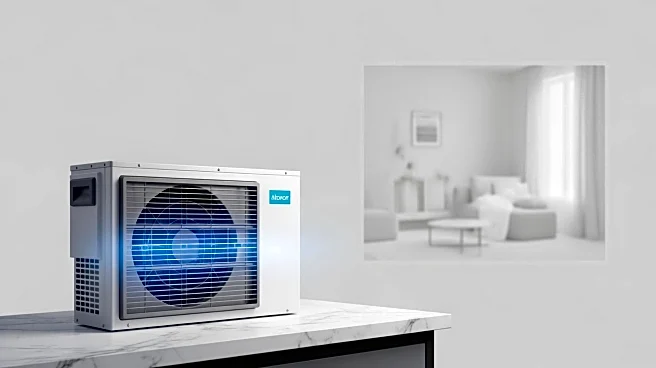What's Happening?
Aira, a Swedish heat-pump startup, is gaining attention for its innovative heating solutions that achieve more than 100% efficiency. Heat pumps, unlike traditional fossil-fuel heating systems, move heat rather
than generate it, allowing them to deliver more energy than they consume. This efficiency is measured using the Coefficient of Performance (COP), with newer models reaching COPs of up to 400%, meaning they can be 400% efficient. This technology is particularly beneficial in mild climates where the heat pump can extract more heat from the outside air, reducing energy consumption and costs. However, efficiency can drop in extreme cold temperatures, although newer models are designed to maintain performance even in such conditions.
Why It's Important?
The high efficiency of heat pumps like those developed by Aira represents a significant advancement in home heating technology, offering potential savings on utility bills and reducing reliance on fossil fuels. This shift is crucial for environmental sustainability, as it can lead to lower greenhouse gas emissions. Consumers in regions with favorable electricity prices stand to benefit the most economically, although the initial investment in heat pump technology may be higher. The broader adoption of such efficient systems could drive significant changes in energy consumption patterns and contribute to climate action goals.
What's Next?
As heat pump technology continues to evolve, further improvements in efficiency and performance are expected, particularly in colder climates. This could lead to increased adoption across the U.S., supported by potential government incentives for energy-efficient home upgrades. The market may see increased competition among manufacturers, driving innovation and potentially lowering costs for consumers. Additionally, the environmental benefits could prompt policy shifts towards more sustainable energy solutions.
Beyond the Headlines
The transition to heat pump technology raises questions about the future of traditional heating systems and the infrastructure needed to support widespread adoption. There are also considerations regarding the impact on the energy grid and the need for skilled technicians to install and maintain these systems. As the technology becomes more mainstream, it may influence cultural attitudes towards energy consumption and environmental responsibility.








